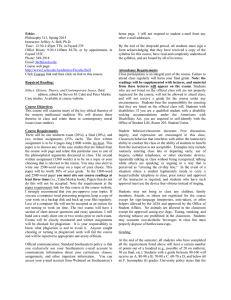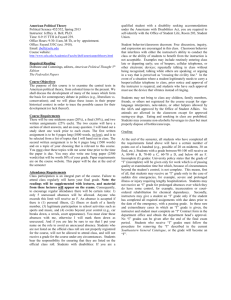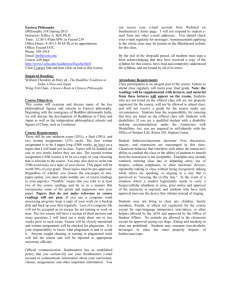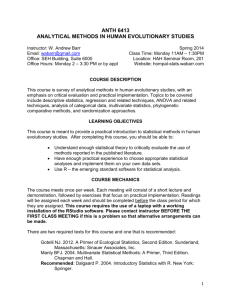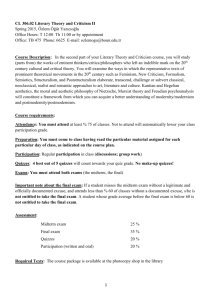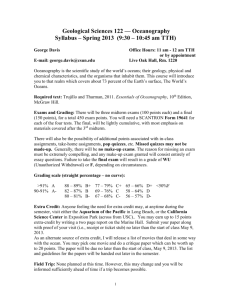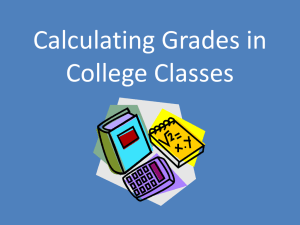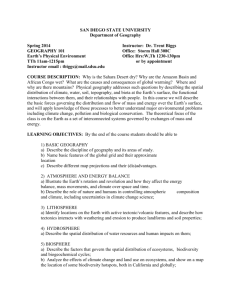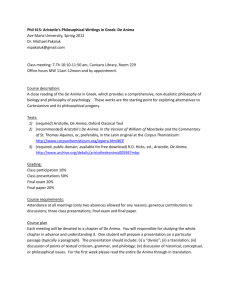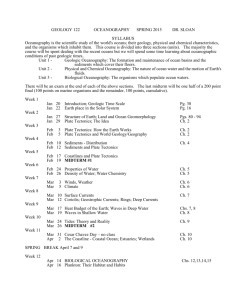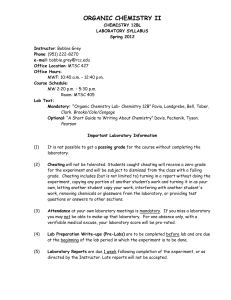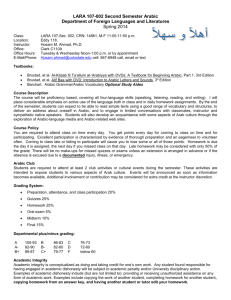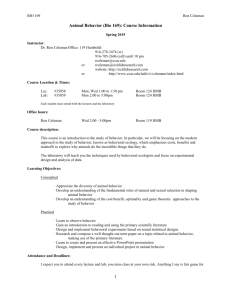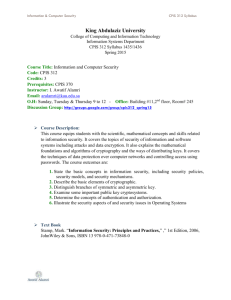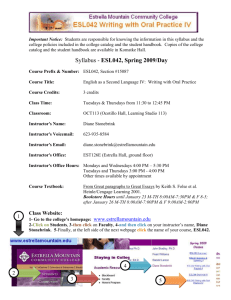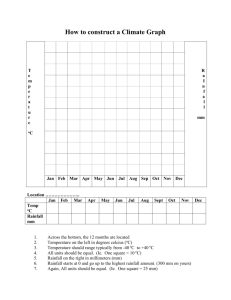words - Southeastern Louisiana University
advertisement
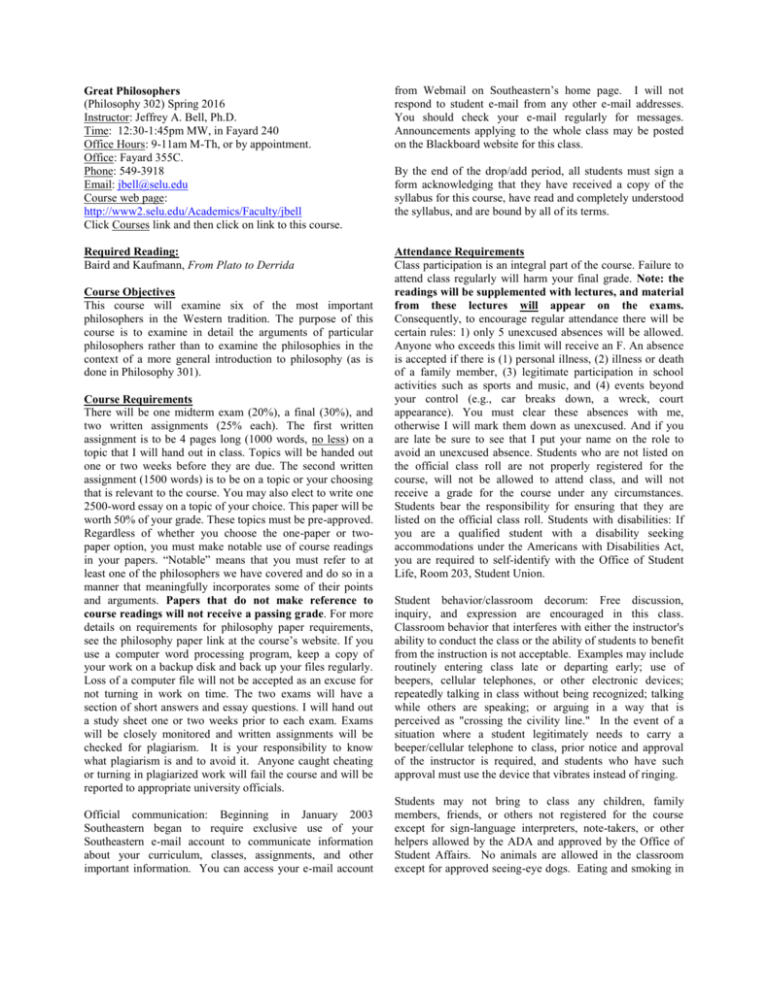
Great Philosophers (Philosophy 302) Spring 2016 Instructor: Jeffrey A. Bell, Ph.D. Time: 12:30-1:45pm MW, in Fayard 240 Office Hours: 9-11am M-Th, or by appointment. Office: Fayard 355C. Phone: 549-3918 Email: jbell@selu.edu Course web page: http://www2.selu.edu/Academics/Faculty/jbell Click Courses link and then click on link to this course. from Webmail on Southeastern’s home page. I will not respond to student e-mail from any other e-mail addresses. You should check your e-mail regularly for messages. Announcements applying to the whole class may be posted on the Blackboard website for this class. Required Reading: Baird and Kaufmann, From Plato to Derrida Attendance Requirements Class participation is an integral part of the course. Failure to attend class regularly will harm your final grade. Note: the readings will be supplemented with lectures, and material from these lectures will appear on the exams. Consequently, to encourage regular attendance there will be certain rules: 1) only 5 unexcused absences will be allowed. Anyone who exceeds this limit will receive an F. An absence is accepted if there is (1) personal illness, (2) illness or death of a family member, (3) legitimate participation in school activities such as sports and music, and (4) events beyond your control (e.g., car breaks down, a wreck, court appearance). You must clear these absences with me, otherwise I will mark them down as unexcused. And if you are late be sure to see that I put your name on the role to avoid an unexcused absence. Students who are not listed on the official class roll are not properly registered for the course, will not be allowed to attend class, and will not receive a grade for the course under any circumstances. Students bear the responsibility for ensuring that they are listed on the official class roll. Students with disabilities: If you are a qualified student with a disability seeking accommodations under the Americans with Disabilities Act, you are required to self-identify with the Office of Student Life, Room 203, Student Union. Course Objectives This course will examine six of the most important philosophers in the Western tradition. The purpose of this course is to examine in detail the arguments of particular philosophers rather than to examine the philosophies in the context of a more general introduction to philosophy (as is done in Philosophy 301). Course Requirements There will be one midterm exam (20%), a final (30%), and two written assignments (25% each). The first written assignment is to be 4 pages long (1000 words, no less) on a topic that I will hand out in class. Topics will be handed out one or two weeks before they are due. The second written assignment (1500 words) is to be on a topic or your choosing that is relevant to the course. You may also elect to write one 2500-word essay on a topic of your choice. This paper will be worth 50% of your grade. These topics must be pre-approved. Regardless of whether you choose the one-paper or twopaper option, you must make notable use of course readings in your papers. “Notable” means that you must refer to at least one of the philosophers we have covered and do so in a manner that meaningfully incorporates some of their points and arguments. Papers that do not make reference to course readings will not receive a passing grade. For more details on requirements for philosophy paper requirements, see the philosophy paper link at the course’s website. If you use a computer word processing program, keep a copy of your work on a backup disk and back up your files regularly. Loss of a computer file will not be accepted as an excuse for not turning in work on time. The two exams will have a section of short answers and essay questions. I will hand out a study sheet one or two weeks prior to each exam. Exams will be closely monitored and written assignments will be checked for plagiarism. It is your responsibility to know what plagiarism is and to avoid it. Anyone caught cheating or turning in plagiarized work will fail the course and will be reported to appropriate university officials. Official communication: Beginning in January 2003 Southeastern began to require exclusive use of your Southeastern e-mail account to communicate information about your curriculum, classes, assignments, and other important information. You can access your e-mail account By the end of the drop/add period, all students must sign a form acknowledging that they have received a copy of the syllabus for this course, have read and completely understood the syllabus, and are bound by all of its terms. Student behavior/classroom decorum: Free discussion, inquiry, and expression are encouraged in this class. Classroom behavior that interferes with either the instructor's ability to conduct the class or the ability of students to benefit from the instruction is not acceptable. Examples may include routinely entering class late or departing early; use of beepers, cellular telephones, or other electronic devices; repeatedly talking in class without being recognized; talking while others are speaking; or arguing in a way that is perceived as "crossing the civility line." In the event of a situation where a student legitimately needs to carry a beeper/cellular telephone to class, prior notice and approval of the instructor is required, and students who have such approval must use the device that vibrates instead of ringing. Students may not bring to class any children, family members, friends, or others not registered for the course except for sign-language interpreters, note-takers, or other helpers allowed by the ADA and approved by the Office of Student Affairs. No animals are allowed in the classroom except for approved seeing-eye dogs. Eating and smoking in class are prohibited. Students may consume non-alcoholic beverages in class but must properly dispose of bottles/cans/cups. Feb 8-11 No class. Mardi Gras break. Grading: Feb 22 Spinoza, Ethics Part 1 Paper topics handed out. Feb 24 “ start Ethics, Part 2 Study guide for midterm posted. At the end of the semester, all students who have completed all the requirements listed above will have a certain number of points out of a hundred (e.g., possible of 20 on midterm, 30 on final, etc.). Students with a grade between 90-100 will receive an A, 80-90 a B, 70-80 a C, 60-70 a D, and below 60 an F. Incomplete (I) grades: University policy states that the grade of “I” (incomplete) will be given only for work which is of passing quality at examination time but which, because of circumstances beyond the student’s control, is not complete. This means, first of all, that students may receive an “I” grade only in the case of sudden dire emergencies, for example, severe and prolonged illness or injury requiring lengthy hospitalization. Students may not receive an “I” grade for prolonged absences over which they do have some control, for example, incarceration or court-ordered rehabilitation for chemical dependency. Secondly, instructors may give a student an “I” grade only if the student has completed all required assignments with due dates prior to the date of the emergency, with a passing grade. In those rare and extraordinary cases in which an “I” grade is given, the instructor and student must complete an “I” Contract form in the department office and obtain the department head’s approval. No “I” grades can be given after the end of the final exam period. Students who receive “I” grades must follow the procedure for removing the “I” described in the current Southeastern General Catalogue, or the grade will become an “F”. Posting Grades: During the semester grades will not be posted for this class. All graded assignments will be returned in class as soon as they are graded. The instructor is required to keep final exams on file for a year following completion of the course. Final course grades will be posted on the Peoplesoft system. Do not call the department office or the instructor’s office to ask about grades—it is illegal to give such information over the phone. Reading Assignments Jan 13 Introduction Jan 18 Jan 20 No Class. MLK holiday. Aristotle, Categories (online at course website), chs. 1-5. Jan 25 Jan 27 Aristotle, Physics, pp. 151-61. Aristotle, Metaphysics, pp. 162-77. Feb 1 Feb 3 Aristotle, On the Soul, pp. 178-83. Aristotle, Nichomachean Ethics, pp. 184-220. Feb 15 “ pp. 220-242. Feb 17 Spinoza, Ethics, Sec. 1. Feb 29 Mar 2 Mar 7 Mar 9 “ “ “ Review for Midterm. Midterm. Mar 14 Hume, An Enquiry Concerning Human Understanding, pp. 714-720. Mar 16 “ pp. 720-739. Papers Due. Mar 21 “ pp. 739-773. Mar 23 Kant, Prolegomena to Any Future Metaphysics March 24 is Last Day to Drop March 25 – April 1 Spring Break Apr 4 Apr 6 Kant, Prolegomena Foundations of the Metaphysics of Morals Apr 11 “ Apr 13 Heidegger, An Introduction to Metaphysics, pp. 1066-1089. Apr 18 Apr 20 “ “ Apr 25 Wittgenstein, 1093-1118 Study guide for final exam posted Apr 27 “ May 2 May 4 “ Review. Final papers Due. May 12 (Thursday) Final Exam. 10:15am-12:15pm
